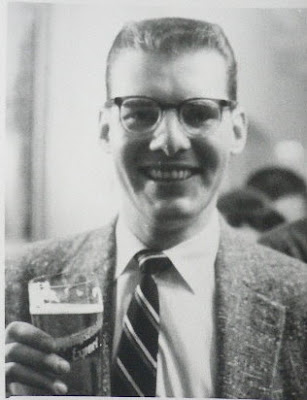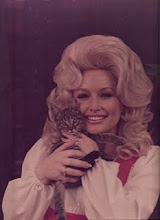
Here's an issue: can you "find" photographs or other ephemera online in the same way you can offline? A photograph is already distanced from temporal issues in such a way that I wonder what that extra step out of the world does to an image. Often there's more description to an image online, if only, in this case "Great shot of Dad enjoying a beer in Germany, circa 1958. " though there's still enough ambiguity contained in that so as not to stifle the personal speculation that adds a wonderful richness to the photograph. Though, while there's one is not hindered from developing a unique narrative surrounding the picture the context of the find is removed.
Flickr will never be a dusty attic, I guess, but maybe there's something else to it. Maybe the sharer's impulse to share? Or the implications of putting an image on the web, the fact that now, no matter what, it will always be there? In that respect maybe posting old and new photographs online holds exactly the same import as physically collecting them, the internet memorializes these subjective moments in a way, really, that no collection ever could.
Anyhow, there's a link above to the original posting of the above image and Here's another link to the wonderful set it belongs to. If anyone has any other great online finds, I'd love to see them, send 'em my way.

This is such an interesting question that you pose. I hope your classmates respond. (I will try to encourage them). When an image is on the web, it has already been "found" and deemed special. When you find an image, it is your selection that empowers it. So that seems to be a distinction.
ReplyDeleteTheres definately something wonderful about finding a wad of old anonymous photos at a thrift store but a similar process of scavengery can be used on the net regarding creative selections. Something could be posted on the net for a specific reason but you can easily take it out of context to reveal something else about the image or use the image for collage purposes maybe further utilizing the conceptual baggage of the online image.
ReplyDeletehttp://declubz.com/blog/wp-content/uploads/2008/11/weird-shoes-1.jpg
ReplyDeleteyup, right on, it is all about context. cool.
ReplyDeleteBut doesn't the web neutralize everything and create a sense of sameness. In the world, the things your find are still in a narrative and close to their origin.
ReplyDeleteNo matter how I think about it I can't make myself consider online found images the same as offline. The physicality of the offline found image to me defines the sense of being found and offers so many more questions of it's history. Plus, the tactility of a found photograph adds another sense to the discovery, and affects the visual qualities of sheen and size. It's so much more interesting!
ReplyDeleteWhen you find an image on the street, in a junk shop, on the floor of your apartment building, you pick it up and immediately you are the only person in possession of that photograph. You are it's owner, you have inherited this thing like the genie's lamp. Online this is completely the opposite-it's for everyone, you no longer are the sole posessor of this image. And if you find it online, what happens to it next? It can circulate around the web, get printed out, it will always exist in some form. The physical original can exist in your presence or as a memory of the discovery, and can pass on to one new owner at a time. It can even cease to exist, and I find that a powerful idea.
I think what I'm trying to get at is I feel finding an image on the internet unauthentic. It's not just your find, it's available to billions of people. I connect to objects on such a physical level that without that it doesn't seem real. That doesn't mean I'm against images on the internet, I'm all for it. It's the experience that changes. Both for the discoverer, the image, and the image's future.
That question of availability is interesting. In the last apartment I had I lived above three men who were all in their thirties or older. We talked on the front porch, pet their dog, and interacted in that casual, off-hand way, friendly but with no investment. My roommates and I all left for winter break last year and when we got back we saw an eviction notice on our neighbor's door and all their stuff lying on the curb. We read the notice and it was the first time we had learned any of the men's last names. We googled the name and it came up in an obituary for one of the other men who had lived with him downstairs, he had been a pallbearer in his friend's funeral. It didn't seem right that we were able to come across something so personal in such an impersonal way, and that anyone could, and that from now on, they always could. That experience affected me because I wasn’t sure whether I should feel privileged enough to grieve over someone I didn’t know and to have snooped in such a selfish and unselfconscious way.
ReplyDeleteI wonder whether there is a similar effect with found photographs. Where do you get the "right" to own someone's story or someone's image? When you lose something like that or throw it away are you giving up your claim to it?
Part of finding a photograph is the context of the find, and the distance of the physical object from the people who "owned" it before and their actual lives. Maybe the act of finding loads the photograph, or note, or anything, with a new, outside significance but when you find something online it's always traceable. There is always a distinct motive for it having been posted there. When you find something in real life there's a mysterious narrative you can build about why you're finding it at all.
I guess what I was thinking before was that if you found an image online and printed it out. You're basically making it a tangible object, which is absurd and archaic, it is still a found photo, it is just without context, making it extra meaningless and therefore more yours, more the artist's and less stealing meaningful pieces of other people.
ReplyDeleteIs it still yours without the context? I guess the context is the most yours out of anything about a found photo.
ReplyDelete